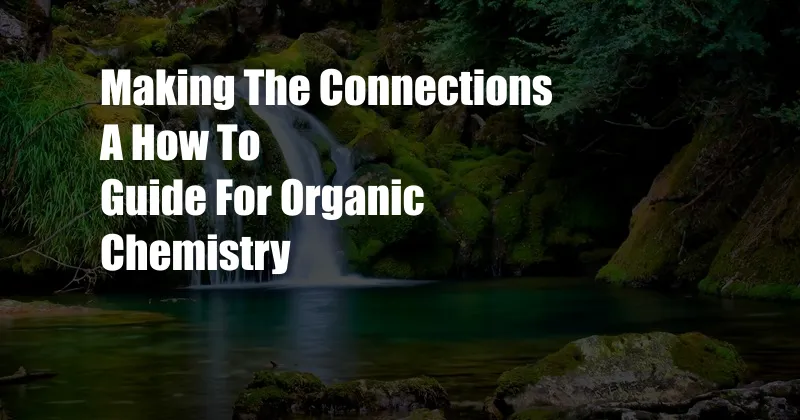
Making the Connections: A How-To Guide for Organic Chemistry
I’ve always been fascinated by the intricate world of organic chemistry. Its ability to shape molecules, create new substances, and unravel the secrets of life’s building blocks is truly awe-inspiring. However, navigating its complex landscape can feel like a daunting task, especially for those just starting out.
That’s why I’m thrilled to share my own journey of understanding organic chemistry with you. Through years of study and practice, I’ve developed a comprehensive approach that breaks down the subject into manageable chunks, making it more accessible and enjoyable. With this guide, you’ll embark on a transformative learning experience, unlocking the secrets of this fascinating field and connecting the dots that make organic chemistry truly come alive.
Understanding Organic Chemistry: The Basics
Organic chemistry is the study of carbon-containing compounds, which form the basis of all living matter. It explores the structure, properties, and reactions of these compounds, providing a fundamental understanding of the chemical world around us.
The key to unlocking organic chemistry lies in comprehending the concept of molecular structure. Carbon atoms have the remarkable ability to bond with various other atoms, including hydrogen, oxygen, nitrogen, and halogen elements. These bonds can form linear chains, branched structures, or even complex rings, giving rise to an almost infinite variety of organic molecules.
Unraveling the Connections: Types of Bonds
The type of bonds formed between atoms determines the properties and behavior of organic compounds. Covalent bonds, where atoms share electrons, are the most common in organic chemistry. The strength of these bonds ranges from single to double to triple, significantly impacting molecular stability.
In addition to covalent bonds, organic molecules can also exhibit polarity. This occurs when electrons are unequally distributed between atoms, creating a separation of charge. Polarity influences molecular interactions, such as solubility and reactivity.
Functional Groups: The Key to Reactivity
Functional groups are specific arrangements of atoms within an organic molecule that impart characteristic properties and reactivity. Each functional group has a unique “signature” that influences how the molecule behaves in chemical reactions.
For example, the hydroxyl group (-OH) is found in alcohols and makes the molecule more hydrophilic (water-loving). The carbonyl group (C=O) is present in ketones and aldehydes and undergoes a variety of important reactions. Recognizing and understanding functional groups is essential for predicting the reactivity of organic compounds.
The Language of Reactions: Mechanisms and Pathways
Organic chemistry is not just about describing molecules; it’s also about understanding how they change. Chemical reactions allow us to transform one compound into another, creating new molecules with novel properties.
To understand reactions, we need to explore reaction mechanisms. These mechanisms describe the step-by-step process by which bonds are broken and formed, leading to the formation of new products. By studying mechanisms, we can predict the outcome of reactions and design synthetic strategies to achieve desired molecular transformations.
The Latest Trends and Developments: Cutting-Edge Organic Chemistry
Organic chemistry is a dynamic field that continuously evolves. Researchers are constantly pushing the boundaries of knowledge, discovering new compounds, and developing novel techniques. Keeping up with the latest trends is crucial for staying abreast of advancements in the field.
Currently, cutting-edge research focuses on areas such as green chemistry, bioorganic chemistry, and materials science. Green chemistry aims to develop sustainable and environmentally friendly synthetic methods. Bioorganic chemistry investigates the chemistry of biological molecules and systems. Materials science explores the design and development of new organic materials with tailored properties.
Tips and Expert Advice for Success in Organic Chemistry
Mastering organic chemistry requires a combination of hard work, dedication, and strategic learning techniques. Here are a few tips to help you succeed:
- Build a Solid Foundation: Begin by understanding the basics, including atomic bonding, molecular structure, and functional groups.
- Practice Regularly: Solve problems, draw molecules, and write mechanisms to reinforce your understanding.
- Study in Groups: Engage with peers, discuss concepts, and learn from different perspectives.
Additionally, take advantage of available resources such as online tutorials, virtual simulations, and discussion forums. Don’t hesitate to consult with instructors or tutors when facing difficulties.
FAQ: Frequently Asked Questions About Organic Chemistry
Q: What is the difference between organic and inorganic chemistry?
A: Organic chemistry focuses on carbon-containing compounds, while inorganic chemistry deals with compounds that do not contain carbon.
Q: How do I memorize organic reactions?
A: Break down reactions into small steps, understand the mechanism, and practice writing them repeatedly. Flashcards and online quizzing tools can also be helpful.
Q: Is organic chemistry hard?
A: Organic chemistry can be challenging, but it’s not insurmountable. With consistent effort, a strong foundation, and effective learning techniques, you can overcome the difficulties.
Conclusion
Making the connections in organic chemistry is an exciting and rewarding endeavor. By understanding the basics, exploring functional groups, unraveling reaction mechanisms, and keeping up with the latest trends, you’ll gain a comprehensive grasp of this fascinating field. Embrace the challenge, and you’ll discover the beauty and power of organic chemistry, unlocking a world of possibilities for scientific discovery and innovation.
Are you ready to make those connections and become an organic chemistry master? Leave a comment below and let’s continue the conversation!